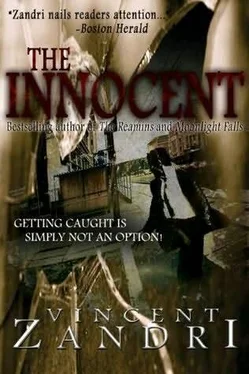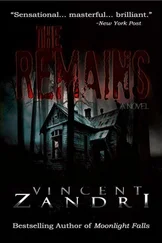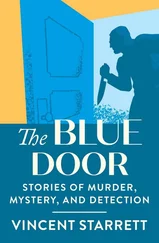I nodded and looked at the perfect X’s Mike had slashed through each of the square calendar days as they’d passed, one after the other. Only five days X’d out so far in May. By the end of the afternoon, there’d be a sixth.
“You think they made up that story about being attacked?”
“I had Logan in my office only a few hours after the escape. Not a single mark on the guy. I saw Mastriano in the hospital a few hours later and, again, the same story. Not a mark on his baby face.”
“Prints or no prints,” Norman said, “you’re not gonna prove a goddamned thing.”
“But it’ll be a start.”
“So who’s running the show down there, anyway?”
“A guy from Stormville PD by the name of Schillinger.”
“Don’t know him,” Norman said. He drank and frowned, either at me or at the cheap brandy in his old coffee. He broke the seal on the freezer bag. Then he pulled out his handkerchief and shrouded the fingers and palm of his right hand before he gripped the pistol. He closed his left eye and sighted in on the short, four-inch barrel. “Don’t see many of these anymore. A genuine relic.”
“You can help?” I asked. “Off the record?” I pulled out a Pall Mall, lit it with the Zippo. Then I took a sip of the booze and wished I hadn’t. Cheap ginger brandy, sold by the gallon for a drinker like Norman who didn’t care how bad his medicine tasted.
Mike straightened up, opened his top drawer, and placed the pistol, bullets, and key ring inside. He closed it, locked it.
“I can help,” he said. “But I get caught, we both go up shit’s creek. Obstructing justice, manipulation of evidence just for starters. Some serious charges going to point you in the face like this Glock hiding inside my armpit.” He downed his coffee and brandy so that the word NOT! stared me in the face again. This time Mike filled his mug with brandy only.
“I’ve considered obstruction already,” I said. “It’s a chance I’ve got to take before Logan and Mastriano go too far with the press.”
“Logan’s not supposed to be opening up his mouth, huh?”
“Department rules. Unwritten, but rules nonetheless.”
Mike smiled.
“It’ll cost you, Keeper. I mean, I’m closing in on retirement, and you know I’ve still got to maintain my desirable attributes as a detective.”
I blew out some smoke slowly.
“Name your price,” I said.
Mike leaned back, crossed his hands in his lap, looked up at the ceiling.
“Don’t rush me,” he said. “Delicate operation like this takes some thinking over.”
I sat down on the armrest of the couch, half sitting, half standing.
“Any ideas, copper?”
“Okay,” he said, “I’ve got it.”
“Uh-oh. Last time I saw that look on your face, I had to buy doughnuts every day for the month of July. Summer of 73, I believe it was. We were at the training academy with Wash Pelton. Cost me fifty bucks in lard and caffeine.”
“This evidence could save your ass, Keeper,” he pointed out.
“Worth more than mere doughnuts, wouldn’t you say?” The smile on his face grew wider.
“Definitely more than doughnut-serious,” I agreed.
“Okay,” Norman said, “I’ve got it. I agree to pull this favor, lunch is on you once a week for the entire summer.”
“Burger King, Wendy’s, Jack-in-the-Box, McDonald’s, Big Kahuna Burger?”
“None of that crap, Marconi.”
I looked at the ceiling. The darkness of Norman’s office made the roof nearly invisible, like a black sky on an overcast night.
“No choice?”
“No choice, pal.”
“Okay,” I said. “Name your venue.”
Norman thought hard for a second or two. He took another drink from his mug.
“Jack’s Oyster House, every Friday, twelve noon. Meet me in the bar for drinks. You buy, of course.”
Jack’s Oyster House was one of the oldest and most expensive eateries on State Street in downtown Albany. Owned by the same Jewish family for nearly four generations, Jack’s was strictly a New York-style, businessman’s restaurant where men dressed in tuxedos and long white aprons served you Beefeater martinis and bloody porterhouse steaks.
“I can’t talk you down?” I posed.
“Them’s the terms, pal.”
“Anyone finds out about this, could get us both in big trouble.”
“Not me, pal,” he said, raising his hands. “You came in here, threatened me with my life. I felt intimidated, had nightmares, began drinking heavily…“ His voice took on a mock quiver.
“You wouldn’t rat on an old buddy, would you, Mike?”
“You ever hear Mike Norman call himself a hero, Keeper? You and Pelton are the ones who made it to the big time. Me, I passed out at Attica. Commission’s never let me live that one down. Nervous breakdown they called it. Catatonic state. Shit, I was a kid, nineteen years old. Those rebel inmates were going to kill us. Changing departments hasn’t helped. Now twenty-five lost years spent in law enforcement and I still can’t make it past lieutenant. They gave me this office-this miserable closet in the corner. But you know what? I don’t give a rat’s ass.”
He took another deep swig from the mug.
“For a cop,” I said, “you’ve got a shaky moral foundation and a bad attitude.”
Norman nodded thoughtfully, as if that was the point. And I guess it was.
“Questionable at best,” he said. Then, taking another pull on his brandy. “Tell you what, you get caught and you get busted, I promise to visit you in the can every Friday, twelve noon, with file sandwiches.”
“File sandwiches?”
“Yours comes with a file stuffed between the ham and cheese.” Planting another smile on that tired, gaunt face.
“Now I see why we’ve been pals all these years,” I said.
“Hey,” Mike said, blowing his nose with the same hankie he’d used on Logan’s.38, “what are friends for?”
IT’S IMPOSSIBLE FOR ME to remember everything that happened during those four hopeless days at Attica. Much of it is distorted, the memories jumbled and mixed together. What I do remember has, over the years, taken on all the sharpness and vividness of the present. What I mean is, there are certain events that repeatedly occur in my mind, as if they have nothing to do with the past at all, as though they are always happening over and over again in the present. Whether or not the events actually happened that way doesn’t matter anymore. Because when it comes to memories, what counts is not accuracy, but the feelings they call up.
I can still see Mike Norman sitting with his back against the stone wall, knees pressed up against his chest. Pelton sits beside me, Indian-style. We say nothing, do nothing. We just stare at Mike, who hasn’t been sick to his stomach for an hour now, or what seems an hour, anyway. It’s hard to tell. The sun is going down over the yard. Bonfires lighting up the night make the yard seem oddly festive, like a carnival of death.
Some of the inmates have been busy hammering together a large platform out of the loose boards and plywood pulled from the physical plant. From here the platform looks like a staging area of some kind. Maybe a gallows. Some of the inmates come into the yard with Ding-Dongs, Twinkies, little bags of potato chips, and other junk looted from the commissary. They offer us nothing to eat, and I know better than to ask. Occasionally a black-and-white chopper makes a flyby, shining bright white spotlights against the gravel floor of the open yard. When it passes, the inmates throw rocks and shout obscenities, as if words alone will bring the chopper down.
What’s the point of choppers, I think.
What can they possibly do for us from the air?
Читать дальше












